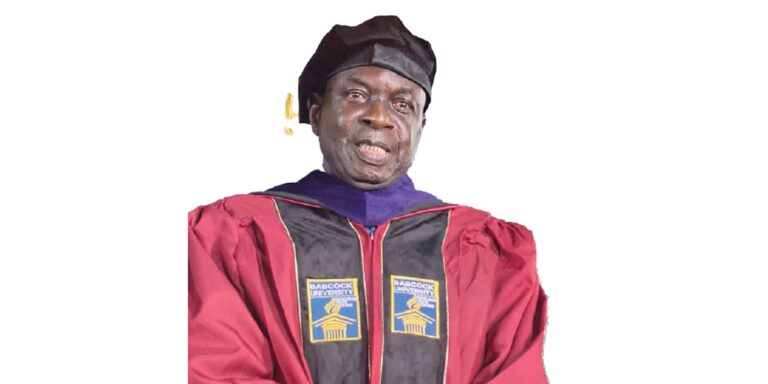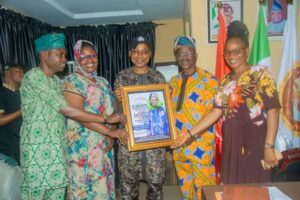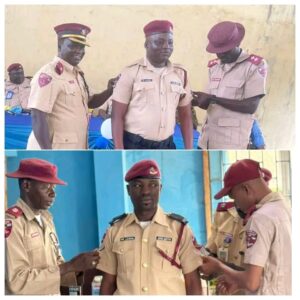
Seventy-one-year-old graduate of Babcock University, Dr Frederick Bolaji, speaks to GRACE EDEMA about growing up in Egbe, Kogi State, building a stellar career in banking, surviving 65 days in Alagbon, and how this experience reignited his childhood passion for law
Where are you from?
I’m the second child of my mother. I’m from Egbe, in Yagba West Local Government Area of Kogi State. That’s the area known for its missionary heritage, including the well-known Egbe Hospital, now called ECWA Hospital.
How was growing up like as a child?
I attended primary school in my hometown. For secondary education, I initially got admission into Egbe Secondary School, one of the best schools in northern Nigeria at the time. Unfortunately, my parents couldn’t afford the fees, so I had to stay at home for three years.
Eventually, I enrolled at Eruku Commercial Secondary School, which is now in Kwara State—not far from my town. I was part of the pioneer set. That meant we were the ones helping to build the school—making blocks, fetching water, and even going to nearby villages like Iye and Kapaji to fetch water and farm. It was a tough start, but a formative experience.
Despite the challenges and limited access to qualified teachers, I was one of the fortunate few who came out with excellent results. From there, I proceeded to the School of Basic Studies at the then Kwara State College of Technology (now Kwara Polytechnic), where I completed my A-Levels.
Afterward, I gained admission into the University of Ibadan, where I earned a B.Sc. (Honours) in Economics. I then served in the NYSC programme at Kagoro, now in Kaduna State, teaching at Kagoro Secondary School, which was a national school at the time.
Upon completing my service, I secured a job with the International Bank for West Africa, which later became Afribank Nigeria PLC. That bank went through several transformations—from Afribank to Mainstreet Bank, to Skye Bank, and now Polaris Bank. Each change brought in new leadership and a shift in direction. Eventually, I chose to voluntarily retire.
Why did you retire voluntarily?
I had grown weary of the constant reshuffling, especially seeing young, inexperienced individuals—many of whom had access to sudden wealth—taking over and influencing the banking sector.
I still hold the belief that some of those who rose quickly in the system should be investigated. Their financial activities deserve scrutiny, not just for accountability’s sake, but for the good of the country’s future
The truth is that the banking industry is where many of Nigeria’s deeper systemic problems began—and unfortunately, it still remains a major part of the problem today. That’s one of the reasons I chose to voluntarily retire. At that time, I was a Deputy General Manager at Afribank.
I remember vividly—one of the new investors in the bank approached me and said, ‘You can’t leave. We understand your value, we know your expertise in banking, and we want to build the bank around you.’ But I politely told him, ‘No, I think it’s time I go out there and build something of my own.’
It became a controversial decision. Many of my colleagues didn’t understand it at the time. They thought I was making a mistake. So, I left—and now, years later, many of them are trying to reconnect as friends.
After leaving the bank, I went on to establish my own law firm. While preparing to transition, I had already begun studying law at the Lagos State University. Fortunately, most of the lectures were scheduled on weekends—Fridays, Saturdays, and Sundays. I often missed the Friday classes due to work, but I organized extra tutorials to catch up
Interestingly, some of the full-time students became my tutors—and many of them remain my friends till today. With discipline and planning, I completed my studies successfully. I wasn’t a first-class student, but I graduated with a solid result.
From there, I proceeded to the Nigerian Law School and was posted to the Bwari campus in Abuja. Since then, I’ve been in and out of legal practice.
What happened thereafter
Later on, when the Central Bank of Nigeria intervened in some of the failing banks—including my former bank—they reached out to me. They thought that because I understood Afribank deeply, I would be able to help fix its problems. In fact, Dr Sarah Alade, then the Deputy Governor of CBN, who was familiar with some of my associates, encouraged them to speak with me.
But I declined. I felt it was too risky, and I had moved on. Some people were bitter about my refusal, especially because I had voluntarily resigned—a move that was almost unheard of in the bank at that time. I remember telling them, ‘If I return, they’ll kill me.’ That was how intense and political the environment had become.
After several months of persuasion, they finally convinced me to take a position at the then Bank PHB, which is now Keystone Bank. I was posted to Bank PHB between 2010 and 2011 as the Executive Director in charge of Operations, Branch Management, and Information Technology.
I held that position until the CBN decided to sell the bank to new investors. Some of the investors wanted a few of us to remain, but I wasn’t interested in becoming part of the investor-backed team. I chose to step aside.
Since then, I’ve been on my own—doing things quietly and in my own way. During that period, I also took the time to register for and complete the Chartered Institute of Bankers of Nigeria examinations. Today, I’m a certified banker and a qualified chartered accountant.
In fact, I’m a fellow of both the Institute of Chartered Accountants of Nigeria, and the Chartered Institute of Bankers of Nigeria. I believe I’ve built a solid reputation in both institutions.
I’m also a member of the Chartered Institute of Arbitrators. If not for my tight schedule at Bank PHB, I likely would have attained fellowship status there as well. There were some important training I couldn’t attend due to the demands of that role.
What year did you complete your law degree and when did you start your law firm?
I completed my LLB in 2004. I studied at Lagos State University from around 1998 to 2004. In those days, university education was frequently disrupted by strikes and other crises, which prolonged the duration of study.
After graduating in 2004, I proceeded to the Nigerian Law School and attended the Bwari campus in Abuja from 2004 to 2005. At that time, I was still a staff member at Afribank, but I took a study leave without pay to attend law school. When I completed my legal training, I returned to the bank briefly and then voluntarily retired in 2006.
Why law? Was it just because of the turbulence in banking, or was there a deeper reason?
To be honest, my love for law goes way back. From the very beginning, law was my first passion. But because I was unable to go straight into secondary school after primary school—due to financial constraints—I couldn’t pursue that dream early on.
Eventually, I enrolled in a commercial secondary school after staying at home for three years. My late father, who was a devout Christian, often told me, ‘Lawyers will not make heaven. They are liars.’ I believed him, given my limited exposure at the time.
So, even though my school later introduced some arts and science subjects, I avoided most of the arts classes because I was afraid of disappointing my father. I leaned more toward commercial subjects, which led me to study Economics.
Initially, I wanted to study accounting. I applied to both UNILAG and ABU, which were among the few universities offering B.Sc. Accounting at the time. But I wasn’t offered admission in either school for that course.
I was offered admission to study Economics at both the University of Ife (now Obafemi Awolowo University) and the University of Lagos, but I eventually chose the University of Ibadan.
Now, the turning point for my decision to study law came after a rather unfortunate incident during my time in the banking sector. At one point, I was the Branch Manager of our Apapa branch—this was even before I purchased a property in that area.
Among my customers then were some Indian and Chinese businessmen who also had relationships with a few of my superiors at the bank’s headquarters. Eventually, those foreign business owners ran into serious issues with some of the bank’s directors.
This matter was escalated to the Nigeria Police Force under the newly created Nigeria Interpol Criminal Investigation Department during the era of high profile banking collapses.
Sadly, I became one of the scapegoats. Alongside three of my bosses—an Executive Director and two General Managers—I was arrested and detained at Alagbon for 65 days. I slept on bare floor. This was despite memos clearly showing that I had raised objections and distanced myself from the questionable transactions.
How were you roped into the matter?
There was one individual involved in the investigation—who, perhaps in an effort to protect someone else at the corporate branch, manipulated the documentation. They simply took the name of a lady who was involved and replaced it with mine. I became the fall guy.
Eventually, after 65 grueling days in detention—unlike others at the time who spent years—we were released. It became clear that we were caught in the middle of a power struggle between the bank’s board chairman, Chief Eniola Fadayomi, and the Managing Director at the time, Mr Idusem. Their internal conflict led to our victimisation.
That experience—of being punished for what I didn’t do—reignited my long-suppressed desire to study law. I wanted to understand the system and equip myself with the tools to fight injustice, not just for myself but for others who might find themselves in similar situations.
It came alive again. So, when we were released, the very first thing I did was to find out where I could study law without disrupting my regular work schedule. Thankfully, it became quite easy to manage, and that’s what truly reawakened my interest in law.
Do you have any regrets about the decision to study law?
No! I have no regrets today about choosing to study law.
So, how long have you been practising now?
Well, I’ve been practising since 2006.
Let’s talk about your programme at Babcock University. You were announced as the oldest PhD graduate—how did you feel about that?
Interestingly, I only found out on the day of the convocation ceremony. I had no idea before then that I was the oldest PhD graduate in that cohort.
Were there other elderly people in the programme as well?
Yes, there were. But I never knew I was older than them. While preparing for the graduation, I got to know through the College of Postgraduate Studies that there was another woman who was actually born in 1954, just like me.
However, it turned out that I was born in January 1954, while she was born sometime around May or June of the same year. So, that made me the oldest.
That was when I had the feeling that I was possibly one of the oldest in the group. But it was only on the day of the convocation that it became very obvious. There were people I had interacted with closely during the programme whom I actually thought were older than me.
One in particular—a very outspoken political science scholar—I was convinced he was older than me. But I later found out he was born in 1959!
Law is often described as a very cumbersome and voluminous course. What was the experience like for you?
I wouldn’t agree with you. Law is not cumbersome. People make it seem cumbersome. Law is just as straightforward as any other course once you apply yourself.
What many people think makes law difficult, like learning Latin or Greek expressions, is no longer a core part of modern legal education. Even in places like Canada or the United States today, many of those old traditions, such as wearing wigs and gowns, have been discontinued. Lawyers wear regular suits to practise.
You don’t have to start speaking Greek or Latin to understand the law. In fact, back in law school, we used to joke among ourselves: ‘You want to sew a dress for your wife? Make sure the tailor knows Latin first!’ But really, law is interesting. It’s not as intimidating as people assume. It just requires commitment.
Concerning your PhD, how did you manage your reading schedule?
Well, generally, because I’m self-employed, I have the flexibility to structure my day. That means I can always organise myself to read whenever I need to, especially during office hours.
I usually dedicate specific times during the day for academic work, particularly when I have upcoming deadlines or presentations. That freedom allowed me to balance both work and my PhD requirements effectively.
For instance, I have a fully equipped library in my office—that’s one. Secondly, after watching the NTA news at 9 pm and Channels Television news at 10 pm, I usually wind down for the day. By five minutes to 11, I turn off the television and retire to bed.
Once I’m in bed, and all things being equal, I typically wake up around 2 am after sleeping for two to three hours. I then read until about 4 or 4:30 am. After that, I return to bed briefly and get up again by 6:30 or 7 am for morning prayers with my family. From there, everyone begins their day. This has become part of my daily routine. I read virtually every day.
Now, to share my general philosophy with you: in today’s world, no nation is without its challenges. You may be younger than I am, but this is something worth noting. My first child, a daughter, lives in Canada and works as a public health practitioner. I understand the kind of challenges she faces over there, too.
There is a narrative I strongly believe in: Nigerians are excelling across the globe. Whether it’s in the UK, the US, Canada, or elsewhere, Nigerians are making their mark in virtually every field—healthcare, academics, music, and technology.
In the UK, some of the best nurses, doctors, and pharmacists are Nigerians. In America, many top university professors are Nigerians. In Canada’s public health sector, Nigerians dominate.
Even in the global entertainment scene, Nigerian music is resonating. Just two days ago, I saw a clip of British football fans celebrating—dancing and singing along to Nigerian music. In tech, Nigerians are rising fast, right behind Indians and the Chinese.
So, what does this mean? If you create the right enabling environment, Nigerians can achieve anything—even space exploration. I’m especially proud that a Nigerian recently joined a team involved in space travel.
However, we must address the entitlement mentality. Nothing comes cheap—not even respect. You must earn it through discipline, consistency, and hard work.
Lately, I’ve been receiving calls from people I worked with years ago at International Bank for West Africa. Many had lost contact with me, yet they’re now calling from places like Switzerland, the US, and South Africa.
They saw my name online, particularly in connection with my recent graduation, and they expressed their pride. One of them, after I told him I specialise in international investment arbitration, was so excited he said, ‘That’s a fantastic area! We’ll introduce you to our team in New Zealand.’
Nigeria is currently engaging with various organisations on foreign direct investment —an area where my expertise can be useful. If the right connections and platforms are made available, I’m open to contributing to government efforts in that direction.
To summarise: Nigerians are not lazy, and we are certainly not dull. We are intelligent, brilliant, and resourceful. With the right systems in place, we can achieve extraordinary things.
PUNCH









